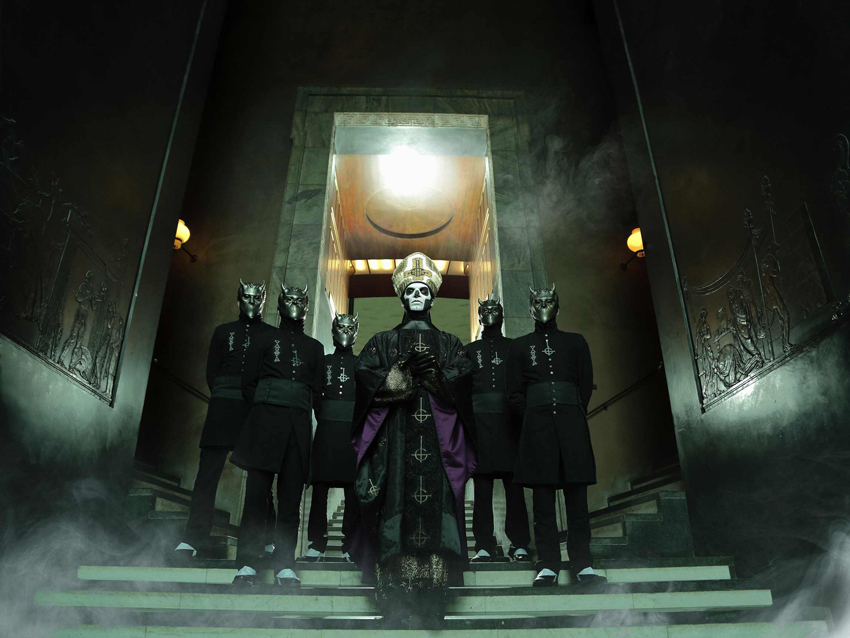
Introduction
Back in May, late-night TV viewers catching a VH1 showing of the comedy classic Caddyshack must have thought that their remotes accidentally clicked over to cable access when a strange and mysterious commercial aired, announcing, of all things, the return of the masked band Ghost.
In the spot, the mostly unseen Swedish metallers are seated at a table while getting a lecture from a stern, elderly female authority figure who chastises the band for their failings: "No churches overthrown. No governments toppled. No world leaders converted to the cause. You're terrible salesmen. It's a disgrace." (She does preface her condemnations with some positives: "Two albums, one gold - these are respectable numbers.")
At the end of her speech, the woman presents the band with new masks before introducing their new frontman, Papa Emeritus III, whom she notes is "three months younger" than his brother and predecessor, the recently retired Papa Emeritus II ("a wounded, bitter old man - he's washed up").
"She was a feisty one," says the band's lead guitarist, chief songwriter and all-around head Nameless Ghoul (for the uninitiated, all the members of Ghost are called Nameless Ghouls). "She's kind of like one of those big wigs who doesn't deal with the small merkins that often. For us, it was like seeing a big merkin in action. She gave us our marching orders."
Hostile action
Ghost's 2013 breakthrough album was called Infestissumam, the Latin word for 'hostile'. On August 21, the band releases Meliora, Latin for 'better' (or more specifically, 'the eternal pursuit for something better'), and fans can take the title literally, as the record is yet another creative giant leap forward for the group, mixing up in various and fascinating ways '70s-era psychedelic and prog rock, unhinged doom metal and classic AOR balladry - all of it informed by a pronounced, sophisticated pop consciousness that yields ear candy-like hooks that last for days.
The Nameless Ghoul sat down with MusicRadar recently to talk about the new album, picking new Papas and why it took the band eight years to record one of their best songs.
Ghost's Meliora can be pre-ordered at the Official Ghost Store.
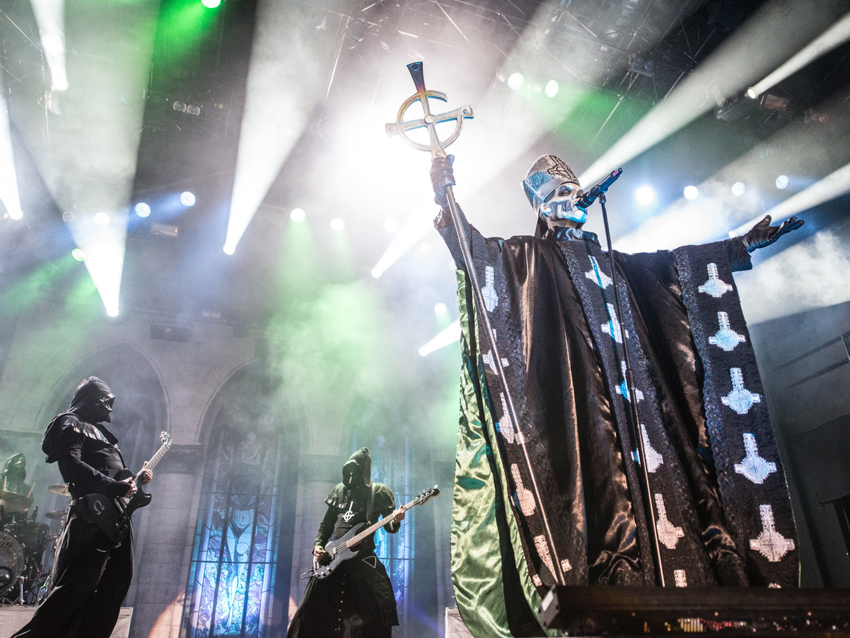
Picking Papas
Is there any kind of special audition process for picking a new Papa Emeritus?
"Fortunately for us, we don't have to do auditions where you put people through the paces. We just expect somebody to be on time, in tune and somewhat glad. Usually we don't see much of our Papas - 'cause they're hanging out with the mamas. [Laughs] They tend to appear as we go on stage and disappear just as quickly. We don't socialize or fraternise that much, which is cool. I don't know him very well, really. He's very new to me."
The fact that the various Papas are 'emeritus', does that mean that they never really go away?
"Well, that's the ironic thing. 'Emeritus' in the tradition of popes means that you're dead - you never get that title until after you've died. Benedictus was the first pope in something like 400 years who was named 'emeritus' while he's still alive. He got to retire with that title. So our Papa Emerituses get to retire, but they're still here."
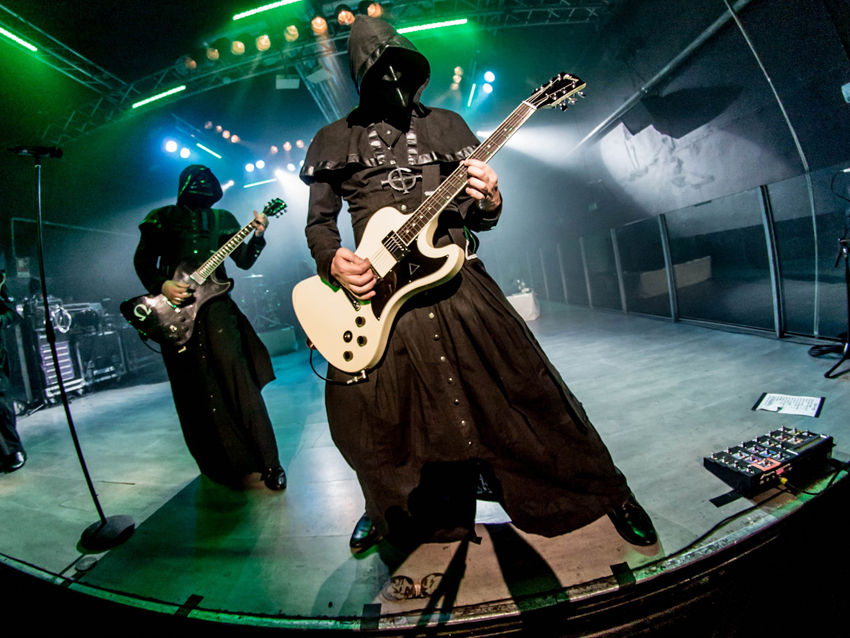
RD team
Let's talk guitars. Are you still working with the Gibson RD model?
"Still using them, yes, especially on a live basis. When we're recording in the studio, we tend to mix it up a little, just because it feels good to play with slightly older guitars. Also, a Flying V sounds different from a Les Paul, and a Les Paul sounds different from an SG, and so on. So we flip-flop between different models.
"But yes, on a live basis, we're definitely an RD band. We really like that model. It wasn't very popular to begin with, and when we started using them, we thought, 'Oh, well, everybody's gonna play them now.' Not because they saw us using them, but that's just the way those things happen - you're part of a wave of a trend. It's like when you hear Nicki Minaj on the radio, and the next day she's everywhere and everybody's talking about her. But that hasn't happened with the RDs, oddly enough. We're still the only ones playing them."
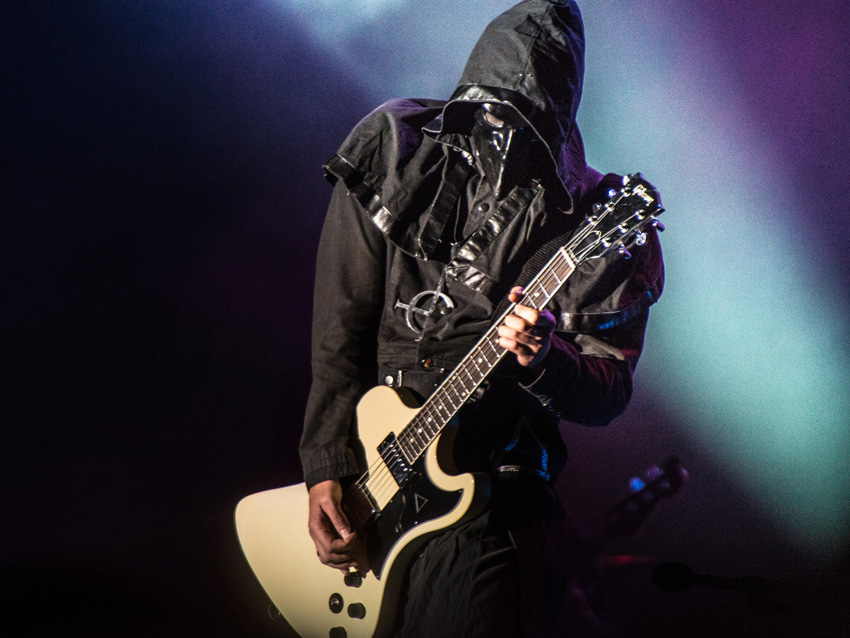
Producing Meliora
Why didn't you work with producer Nick Raskulinecz again, and how did you choose Klas Åhlund to do the new record?
"We really liked working with Nick, and had my wallet been bigger, I would have flown him in for an entire recording - just for the laughs. So Nick had to stay home while we recorded with someone else. We chose to work with Klas Åhlund - he's Swedish, obviously - who until recently was known for his pop stuff. That's what people worldwide know him for, I should say, but here in Sweden we know him for being a very eclectic demon producer. His band Teddybears turned into a dance music hit-driven band, but they started out as grindcore. Despite all the pop that he's doing, underneath that is a big rock guy.
"We write rock music with a big pop sensibility, and Klas writes pop music with a big rock sensibility, so we knew this could be a good match. As it turned out, he wanted to do a rock record - the timing was perfect. He's a guitar shredder, actually. His two major idols are Uli Jon Roth and Ritchie Blackmore."
A lot of the best producers are very diverse. Look at Rick Rubin: You've got Slayer and Johnny Cash.
"Exactly. And Adele and ZZ Top. There you go."
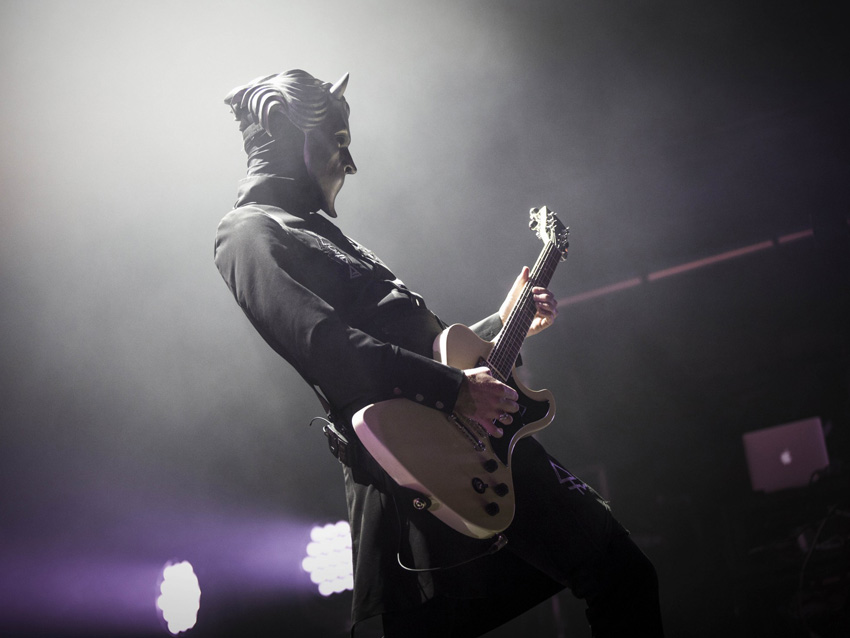
Ghost stories
Let's talk about some of the new songs. I was surprised to learn that you wanted Cirice to have no chorus, yet it's your lead track - and it has a strong chorus.
"Yeah, it's funny how that turned out. We spent a lot of time pre-producing the record, and for us it's like writing a script for a movie - you don't want to write new scenes when you've started shooting. With Cirice, I had the definite idea for a doomy track that was potentially going to be a nine-minute instrumental. Actually, it was called Devil Church/Cirice, and Devil Church was the opening. It was supposed to be dark, dark, just absolutely horrible. [laughs] A very dark song.
"As it happens so many times, Klas said, 'I don't know if this is good enough. Can you work on it for an hour while I step out for a bit?' He wanted us to see if there was something more in the riff that we didn't have yet. So he went out, and we started playing around with things, and all a sudden the chorus came out of nowhere. He came back and said, 'OK, do you have the verse?' I said, 'I do have the verse... and I also have a chorus.' The song just kind of took off from there.
"It's funny, though, because Klas said, 'What have you done to our dark song without a chorus? You've turned it into this completely adult-oriented rock anthem.' But it's better as a six-minute track without the opener than what we were going to do, progging the shit out of it. And we still put Devil Church somewhere else on the album, so it's there. We got everything."
He Is - that's a beautiful song. The track was written a while ago, back in 2007. Did you feel as though the band wasn't quite ready to record it until now or that your audience wasn't ready to absorb it?
"I think there's a hint of both things, but mainly I think it was because I wasn't quite sure how to wrap my head around it. When you're a rock band, it's always a little hard to play softly. Even songs like November Rain or Nothing Else Matters are hard to play - you've got to take your pulse down to be able to approach a different kind of energy level. So that was on my mind.
"We gave the song a try on Infestissumam, but there was a point in pre-production when we kept adding and subtracting and fucking fiddling with it, and we overemphasized the ghastly aspects of it. I think because we're Ghost and we thought it had to sound like us, we just assumed that it needed all of these spiderwebs or something. Super-compensating all of that shit just didn't work, so we put the song away.
"We knew that we liked it, and we knew that it would eventually find its place. When we started the pre-production for this album, we just threw it in the mix. The producer was like, 'Oh, that's great. That's definitely the given song on the record.' We decided to do it the way it was, and it worked."
I think the solo on that song is the best you've ever played. It's magnificent.
"Oh, well, thank you. It's not tapping, but it's a tapping-like technique. There are so many elements to the song that are exactly what was on the original demo - and that was us basically winging it. 'Here's a solo that we'll definitely change at some point.' Fast-forward seven or eight years later and you're like, 'Maybe we shouldn't change it.'"
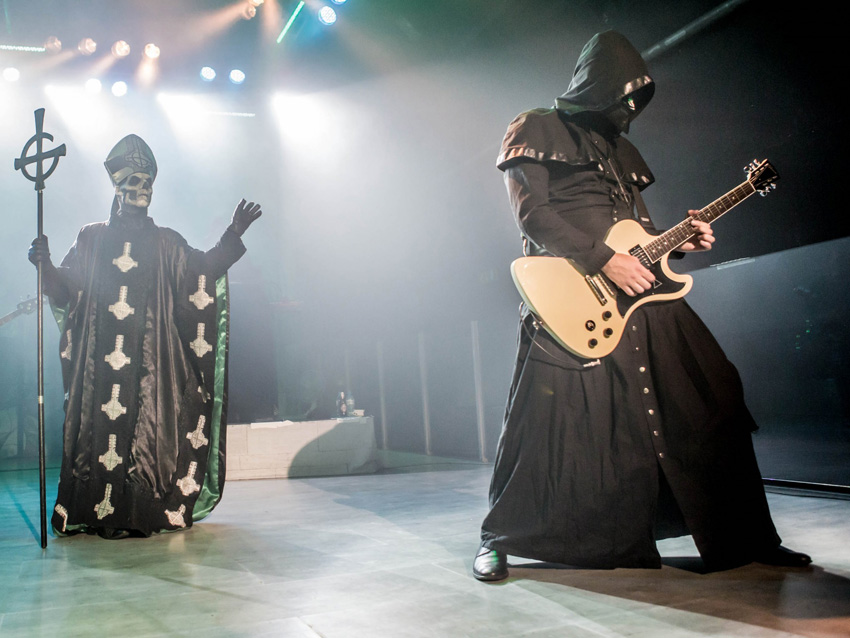
Ghost town
You guys have toured with bands like Mastodon, Avenged Sevenfold, Opeth... Do they behave differently around you than they might with other bands?
"Hmm, I don't know. I know what you mean - we can be... mysterious. I think there's something to that, sure. People have the tendency to be very respectful of us, but you'll always have that asshole, somebody who's showing off to his buddies because maybe they're not fans of the band. That's the exception, not the norm.
"We do act a little differently than a lot of bands, I guess. We don't run around backstage tweeting, Instagraming and taking pictures of every band we see. That's the modern way of doing things, and we don't really do that. To a lot of senior bands, maybe we come off like we're, you know, different.
"I'm not the most social person around, and perhaps I can come off a little stand-offish - just because I don't run around asking everybody for picks and things like that. There's always that high-school corridor element to bands on tour, and sometimes it's just not possible to say hello to other guys: 'Oh, hi, I'm sorry we weren't introduced before.' You can go weeks without actually meeting people you're on tour with.
"With some bands, it's very much a family operation. Iron Maiden has people in their crew who have been there since 1980, '84. In that family, they even have family members who work for the band. We've toured with them a lot in Europe, and it always feels like a home situation with them. They're a British band with an all-British crew, and our crew is mostly British, so we gelled with them very quickly.
"Our anonymity might keep us from being rock stars in some ways, but in other ways we feel like we are rock stars. Sometimes when you're the opener for a big arena band, it can be intimidating. You feel like the new guy at work: You're 18 and everybody else is 35. But that goes away quickly. If you do your job well, you get a second chance, and then you get a third chance. I can't complain about how we've been treated. It's all good."
Joe is a freelance journalist who has, over the past few decades, interviewed hundreds of guitarists for Guitar World, Guitar Player, MusicRadar and Classic Rock. He is also a former editor of Guitar World, contributing writer for Guitar Aficionado and VP of A&R for Island Records. He’s an enthusiastic guitarist, but he’s nowhere near the likes of the people he interviews. Surprisingly, his skills are more suited to the drums. If you need a drummer for your Beatles tribute band, look him up.
